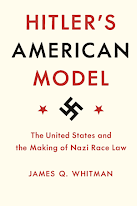For the past several years I have felt like I was back in college. As a history major, I didn’t learn anywhere near as much about American history, racism, fascism and politics as I have learned over the last six years.
It became clear right away that having a sympathetic figure in the White House emboldened the alt-Right, as demonstrated by the 2017 “Unite the Right” rally in Charlottesville, but that event in turn woke the rest of us up to the existence of those previously closeted forces in our country. You can draw a straight line from that rally to the events of January 6, 2021.
I remember how Barack Obama’s election in 2008 represented to many the arrival of a “post-racial America,” but now we realize that it simply awakened the sleeping giant of racism, which entered its fullness with the election of Donald Trump just 8 years later.
Those forces are in the minority, but they are highly energized and, thanks to the courts, they have enough military grade weapons to intimidate the rest of us into submission. But will they?
This “course” we’re all taking has a reading list. Books that I’ve read and recommend include: How Fascism Works, by Jason Stanley; Fascism: A Warning, by Madeleine Albright; Too Much and Never Enough, by Mary Trump; White Rage: The Unspoken Truth of Our Racial Divide, by Carol Anderson; Rage and Fear, both by Bob Woodward; Disloyal, by Michael Cohen; A Warning, by Anonymous; and The 1619 Project, by Nikole Hannah-Jones. I could also cite countless articles in The Atlantic, The New Yorker, and The Guardian. (When you click on the links for those books, you'll see recommendations of books similar to them, many of which I have also read.)
So, what have I learned from this course of study? For starters, I gained a far more complete understanding of slavery and racism in America and how both were embedded in the U.S. Constitution. As I learned from The 1619 Project, one motivation for our revolutionary war was to preserve slavery. (See last week's blog post for details.) I learned how the 13th Amendment, which abolished chattel slavery, provided for inmate slavery, which was utilized by former slaveholders to continue slavery by leasing convicts who were imprisoned for petty or fabricated crimes in Southern jurisdictions. (The 13th Amendment reads, “Neither slavery nor involuntary servitude, except as a punishment for crime whereof the party shall have been duly convicted, shall exist within the United States.”)
I have learned how Trump and his minions have followed the fascist playbook. For most of my life I was puzzled by how middle and lower-income Americans would vote against their own interests, but now I realize that emotional interests can trump financial interests, and that fear of immigrants and persons of color and fear of socialism (undefined, and equated with communism) are proven tools utilized by fascists. The manipulation of working class Americans by Trump (who boasted that he loves “poorly educated” voters) is a textbook case in point.
I also learned from Hannah-Jones’ book that fascist inspiration was a 2-way street. Hitler’s American Model, by James Q. Whitman, describes how Hitler got inspiration from the Jim Crow racism in 20th Century America.
A 2021 book, When People Want Punishment: Retributive Justice and the Puzzle of Authoritarian Popularity, by Lily L Tsai, addresses this very dynamic. Although China is her case study, the final chapter brings the topic home to our domestic situation.
It’s looking as if we may have passed the “tipping point” when it comes to reversing the effects of climate change. Have we also passed the tipping point when it comes to saving democracy? As you and I have learned in this “course,” the U.S. Constitution allows for state legislatures, so many of which are ruled by Republican election deniers thanks to gerrymandering, to overrule the will of the people.
The U.S. Constitution does not dictate how states choose the slate of presidential electors. This has changed over time, but most states — except Nebraska and Maine — send a slate of electors, all of whom are committed to the candidate who got the most votes, no matter how close the vote count was. The U.S. Constitution does not care how a state’s constitution or statutes determine how its slate is constituted.
There’s a real possibility that those Republican-controlled state legislatures may ignore their state’s popular vote and send the electors of their choice to the Electoral College in 2024. That’s a development we all should fear.

No comments:
Post a Comment